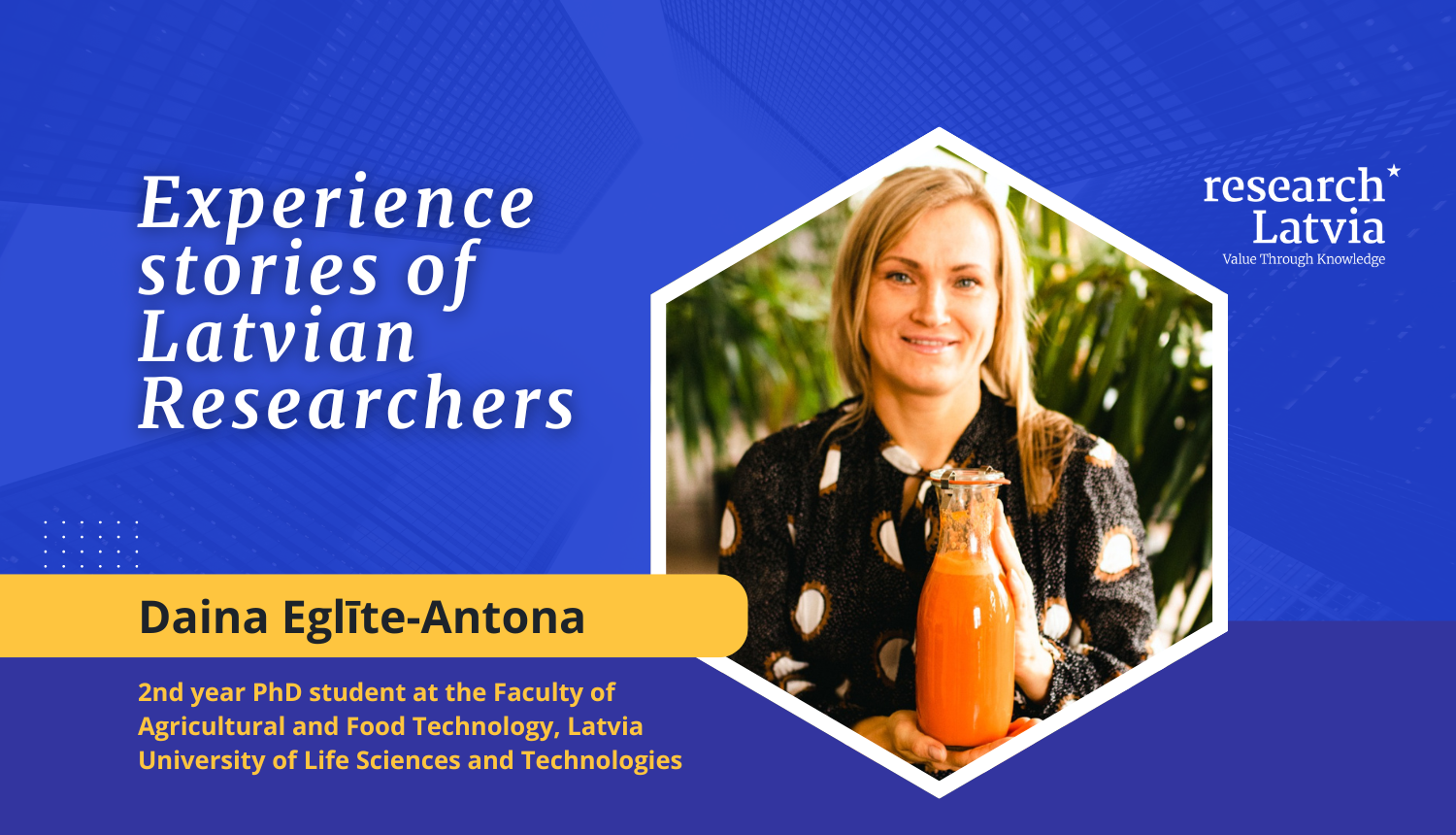Young scientist Daina Eglīte-Antona is studying in the second year of the doctoral program at the Faculty of Agricultural and Food Technologies at Latvia University of Life Sciences and Technologies, where she is researching fermented green buckwheat. Alongside her doctoral studies, she runs the family business “Labas saknes,” which creates and produces new food products from processed vegetables, fruits, and berries. Daina also works at Valmiera Technical School as a food and beverage technologist, leading masterclasses on fermentation and making candies from dried fruits and carrots. In an interview with the science communication portal researchLatvia, D. Eglīte-Antona shares not only her experiences and achievements but also inspires young researchers and students to find their true calling in science.
What are you currently researching?
I study at Latvia University of Life Sciences and Technologies in the Faculty of Agricultural and Food Technologies. My doctoral topic, in brief, is the fermentation of green buckwheat. The first phase of the research focuses on fermentation using mono-microorganisms, where I investigate the fermentation potential of the raw materials, the viability of the microorganisms, and the composition of the metabolites produced during the fermentation process. I then analyze and seek out the most suitable combinations of microorganisms, assessing the viability of probiotics in fermented substrates to maximize the valuable nutrients extracted from buckwheat.
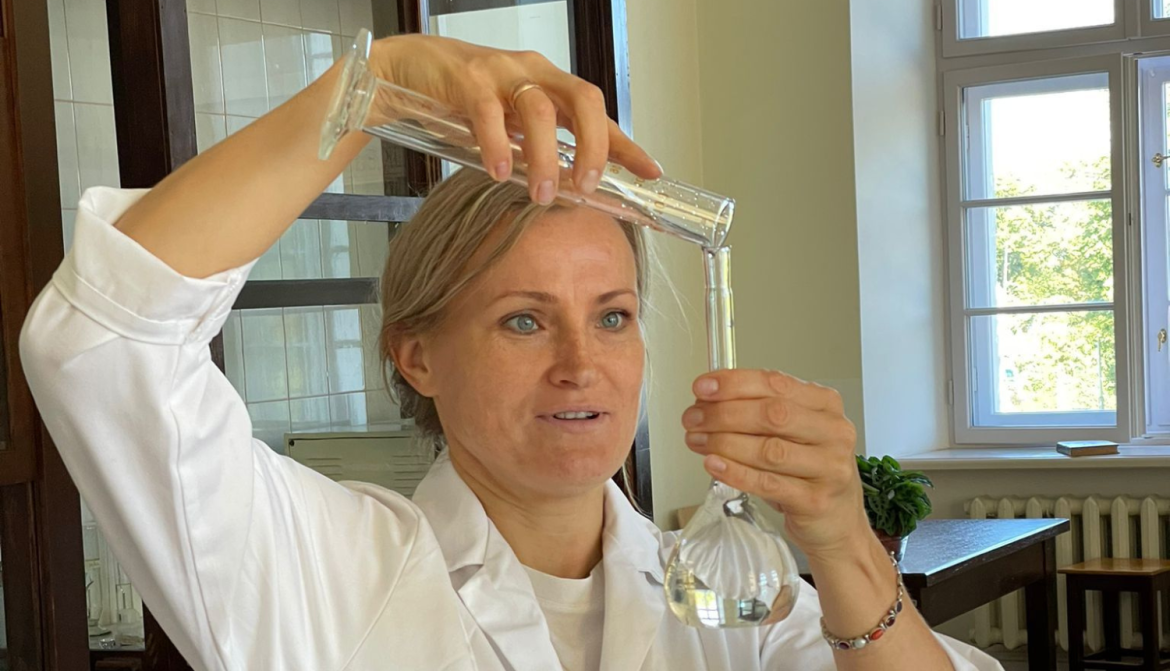
Photo: From personal archive. D. Eglīte-Antona during her studies.
Tell us about your fermented carrot juice.
That was the topic of my master’s thesis. I developed the technological process for obtaining fermented carrot juice. Freshly squeezed carrot juice requires thermal treatment before starting the fermentation process. The fermentation occurs under controlled conditions with a single mono microorganism—Lactobacillus plantarum. As a result, I obtained a juice that is more easily absorbed by the human body than fresh juice. It contains fewer carbohydrates and has a higher carotenoid content compared to freshly squeezed juice. Equally important, the juice has a much longer shelf life. Fresh juice is recommended for consumption within about two days when stored in a cool place, i.e., at refrigerator temperature, while fermented carrot juice can be stored for up to 45 days without any thermal post-treatment.
What are your future plans regarding fermented carrot juice?
I can no longer sell my carrot juice myself because the recipe has been sold to a Latvian company. The company is currently preparing to adapt its facilities for the production of fermented carrot juice in Latvia. It’s a wonderful moment when a developed recipe can be sold to a large company that will take it to the market and share it with the world. Your product is alive! It feels similar to sending a child out into the world. The product you’ve nurtured in the lab, tested on a Petri dish, analyzed, understood how it works, and found the right method for production and scaling it up. I think that’s every technologist’s dream. If you can also incorporate science into it and combine the two, it seems to me that it’s an excellent combination.
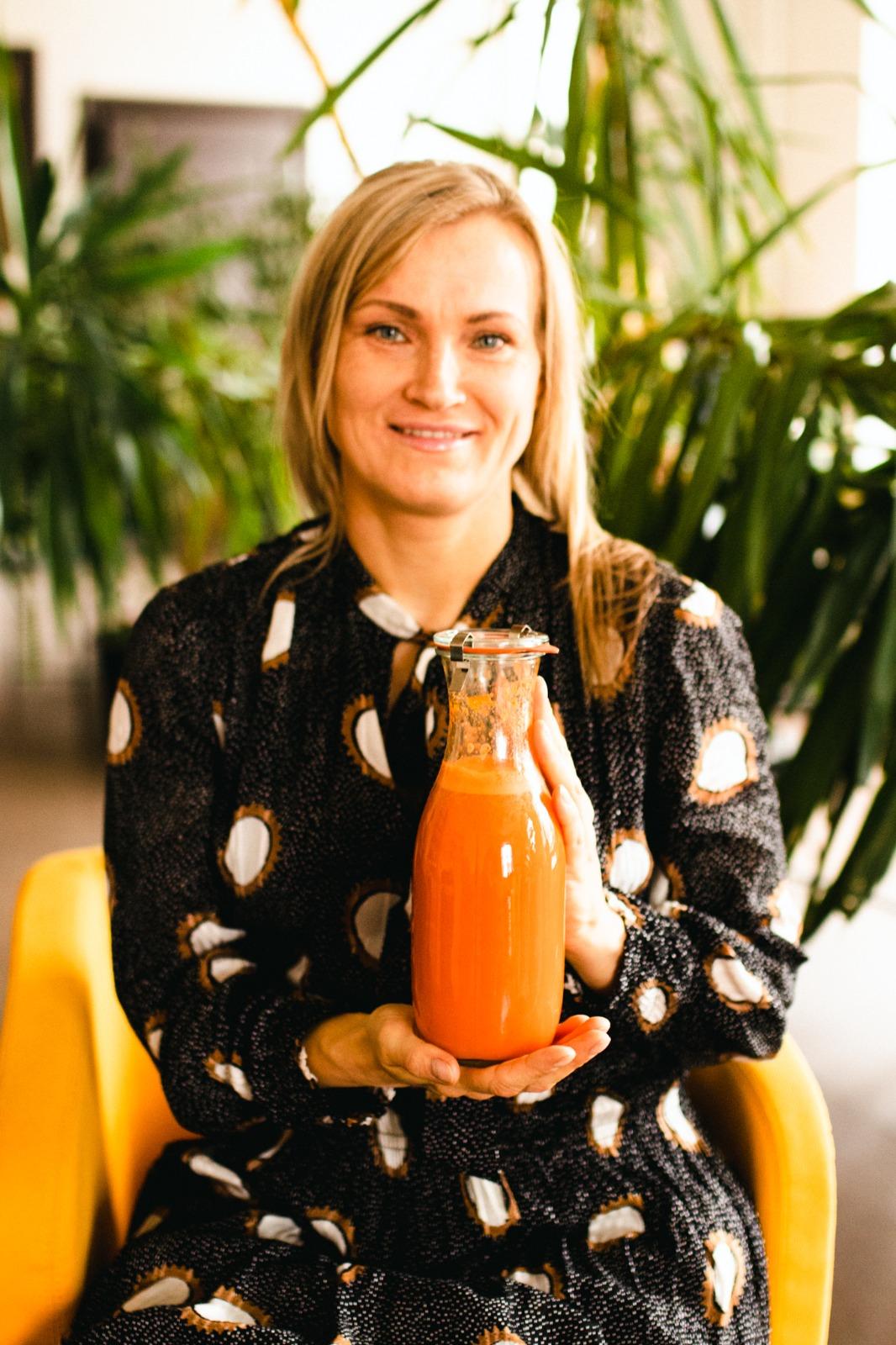
Photo: From personal archive.
What do you think about how easy or difficult it is for scientists and entrepreneurs to collaborate in Latvia?
I know some successful examples, but I also know more that are not so successful. In my opinion, researchers and entrepreneurs speak different languages. Both speak in Latvian, but with different letters. Entrepreneurs usually look at things from a marketing perspective, while scientists focus on the product itself—how to make it better and more accurate. Marketing has slightly different requirements.
I also know successful companies in Latvia that, if I may say so, nurture talent within their organization, creating conditions for technologists to be part of the scientific community and pursue doctoral studies. This provides a good opportunity to access larger funding because if a company has its own researcher, there’s no need to buy expertise from outside. I think this is a very smart investment that several manufacturing companies could learn from—investing in their employees and creating a sustainable feeling of belonging. I believe this is a mutual benefit for both the employee and the entrepreneur.
In general, the national economy would also benefit if doctoral students were given specific research topics. We don’t have that like in Italy, where the state provides topics for master's and doctoral students, essentially issuing government contracts. Students can choose from those topics and then research and analyze in that direction. In Italy, master’s students are paired with doctors to help with product prototyping and analysis phases. Here, there’s mostly some freedom for students, as they come in with their own ideas and topics. In this case, it’s good if the entrepreneur has nurtured that topic and knows what is relevant. I think it’s of great value to know exactly who needs the topic, what needs to be researched, how to research it, what to create, and how to connect everything to commercialize it. That’s very good practice. With an emphasis on the fact that the doctoral student is linked to the company and that science is already part of the production process. With such a hyper-focus, it’s possible to explore deeply, broadly, and competitively to meet global needs.
How did you and your family come up with the idea for your business?
I've thought a lot about where exactly that first click happened. I really dislike throwing away food. I can’t bring myself to throw stale bread in the trash. When I’m at the store or opening the fridge, I really think about what can be combined. That’s the first factor. The second is that our family really loves carrot juice. When we juice the carrots, we end up with the pulp. In Cēsis, the brown bin for food waste has only been around for a few months. If you don’t have a garden, you end up throwing the carrot pulp in the general trash, creating a huge waste mountain. I had the feeling that everyone loves juice because it’s sweet and contains a lot of carbohydrates. But we actually need to monitor our carbohydrate intake or consume less of them. Meanwhile, the carrot pulp is rich in fiber, which most people lack. I guess that was the click. We realized we shouldn't throw it away and needed to come up with something beyond muffins and carrot cakes. The initial idea was to make breakfast crackers from the carrot pulp. We produced the first batch. At that time, our middle son was quite small and attended a toddler playgroup. We brought some to the group and distributed them to the moms for tasting and feedback. When we saw that the moms took the crackers out of the package and didn’t give them to their kids whole but broke them into smaller pieces, we realized that this format wouldn’t work. We immediately started producing small squares, which we called chips. People helped us with that. Afterward, we started making straws because it’s scientifically proven that anything with rounded edges sells better in the market. We also confirmed this scientific finding in our practice. Straws really do sell better than squares.
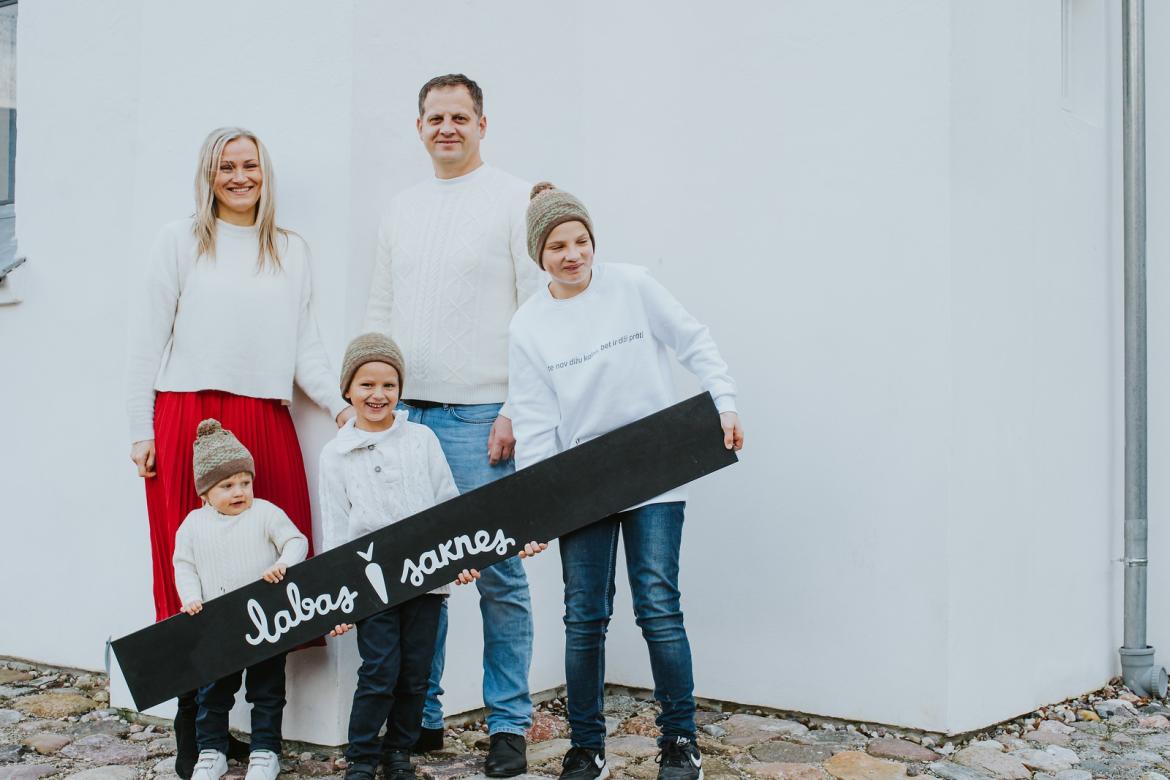
Photo: From personal archive. Daina Eglite-Antona with her family.
How do you manage everything in 24 hours—running your business in Cēsis, working in Valmiera, studying for your doctorate in Jelgava, and raising three sons?
I must have more hours in my day than others. Laughs. I’m probably lucky that my children are independent and my husband is very involved. They have to be self-sufficient and grow up quickly. In a small town, it’s easier to achieve this, for example, the kids mostly get to their activities on foot or by bike. I think when a person does what they need to do and what they truly enjoy, those areas of activity complement or overlap with each other. I feel that where I am, those themes enhance each other, and everything can be connected. They develop each other.
My children have lived through various projects. My middle son was two years old when we created a healthy version of Nutella—a chocolate spread—in Latvia. At that time, he crawled around the production site, climbed into buckets, and participated in the process. I don’t know what my sons will do in life, but they fit so organically into this environment. We had a funny incident. When the war started, our first instinct was to get everyone passports. We took our sons for passport photos in the morning before kindergarten. When we walked into the classroom, the teacher asked my middle son where he had been. He had only heard the word "passport" once, and he said, “I made a delivery note!” So, if there’s a document, it must be a delivery note, not a passport.
We could talk in twenty years about what they’ll do and whether it affects the kids. Each one is completely different. For now, I don’t know if any of them are very interested in food. My oldest son is very good at selling, talking about the product, and interacting with customers; he fits into that sales environment very harmoniously and organically.
When we established our company 'Labas Saknes' in 2018, we started participating in markets. One of the first markets was in the fall, and my oldest son came along. It was chilly outside, the day was long, and he was cold, hungry, and wanting everything else you can imagine. At the market, he realized how much he had to explain and how much people wanted to know about a new and unfamiliar product. It’s not like walking into a supermarket and filling up the cart. On Monday mornings, he would usually ask for money for the week—for some treats. That was the first morning he didn’t ask for money. I was surprised and asked him if he didn’t need it? He replied, “But you know how hard it was to earn it on Saturday? How am I going to spend it now?”
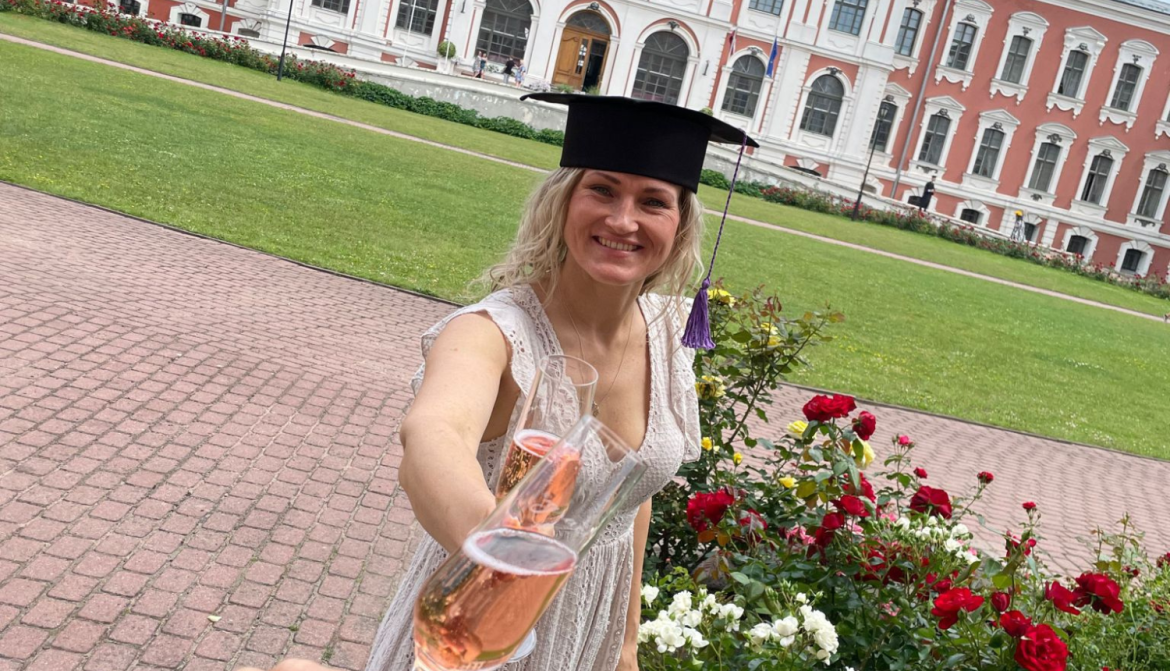
Photo: From the personal archive. D. Eglīte-Antona at the LBTU master’s graduation.
In conclusion. What are your words of advice for students planning to pursue a PhD?
First of all, I want everyone to do what they are meant to do on this earth. I wish for them to find and dedicate the greatest attention and time to understanding their purpose and what they are doing here. If you enter the field of science, be able to hear where your heart beats the strongest.
Secondly, I really hope we can take pride in our origin and products. We research local products too little. For example, 32 different scientists around the world, along with their working groups and funding, have studied kimchi. However, if you want to find research on sauerkraut, there’s almost none. The same goes for buckwheat and berries that grow in Latvia. It would be good to focus on local products and take pride in what we have, rather than highlighting foreign products. We should utilize what grows here and what is available to us. This is important for both the people who live and grow here and for telling a broader story to the world. Conferences can introduce less-known topics, and science can bring Latvia to the world, not just one scientist.
---
About the Series of Articles “Experience Stories of Latvian Scientists”
This article series, created by the communication platform of the Ministry of Education and Science “researchLatvia,” provides insights into the work of Latvian researchers, promoting a deeper understanding of the role of science in society and fostering dialogue between scientists and the broader community.
These stories invite both current and future researchers and the society to explore the achievements of Latvian science and draw inspiration and motivation from the experiences of individuals who have dedicated their careers to scientific endeavors. The interviews are conducted as part of Project No. 1.1.1.1/1/24/I/001 “More Efficient and Smarter Implementation and Management of Latvian Science Policy.”
